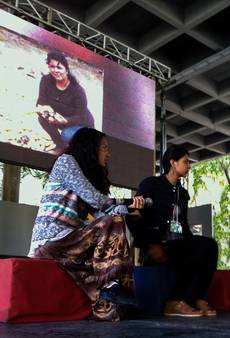Inauguration 2017 Special Coverage w/ Angela Davis, Naomi Klein, Ralph Nader & More
Menu

Special coverage in the Trump Era
From Public Citizen's Corporate Presidency site: "44 Trump administration officials have close ties to the Koch brothers and their network of political groups, particularly Vice President Mike Pence, White House Legislative Affairs Director Marc Short, EPA Administrator Scott Pruitt and White House budget director Mick Mulvaney."
Dark Money author Jane Mayer on The Dangers of President Pence, New Yorker, Oct. 23 issue on-line
Can Time Inc. Survive the Kochs? November 28, 2017 By Jane Mayer
..."This year, among the Kochs’ aims is to spend a projected four hundred million dollars in contributions from themselves and a small group of allied conservative donors they have assembled, to insure Republican victories in the 2018 midterm elections. Ordinarily, political reporters for Time magazine would chronicle this blatant attempt by the Kochs and their allies to buy political influence in the coming election cycle. Will they feel as free to do so now?"...
"Democracy in Chains: The Deep History of the Radical Right’s Stealth Plan for America" see: our site, and George Monbiot's essay on this key book by historian Nancy MacLean.
Full interview with The New Yorker’s Jane Mayer March 29, 2017, Democracy Now! about her article, "The Reclusive Hedge-Fund Tycoon Behind the Trump Presidency: How Robert Mercer Exploited America’s Populist Insurgency."
Democracy Now! Special Broadcast from the Women's March on Washington
The Economics of Happiness -- shorter version
Local Futures offers a free 19-minute abridged version of its award-winning documentary film The Economics of Happiness. It "brings us voices of hope of in a time of crisis." www.localfutures.org.
What's New?
March 03, 2017
Berta C√°ceres -- presente!
From Democracy Now!, March 3, 2017:
Revealed: Environmental Activist Berta C√°ceres' Suspected Killers Received U.S. Military Training
****
Thursday, March 02, 2017
The Vision and Legacy of Berta C√°ceres
An interview with Berta Zúñiga Cáceres and Laura Zúñiga Cáceres by Beverly Bell
...Last September, all the evidence C√°ceres' family had collected over many months was stolen, almost certainly by the government. The government has also refused to share information with the family and to allow independent parties like the Inter-American Commission on Human Rights to help with the process.
Please contact your US congressperson to urge him or her to endorse the Berta C√°ceres Human Rights Act, which is being re-introduced today, March 2, 2017. It compels the US government to cut military aid to Honduras until it improves its human rights record. Please spread the call to your networks, too.
The legacy of Cáceres’ vision and work lives on. Here, two of her daughters discuss Cáceres’ political, spiritual, and intellectual heritage.
Berta Zuniga C√°ceres, Laura Zuniga C√°ceres, and Gustavo Castro Soto presenting on "the Revolutions of Berta C√°ceres" at the opening session of the international Forum on Emancipatory Paradigms. Havana, January 10, 2017. (Credit: Beverly Bell)
Beverly Bell: How do you see your mother’s legacy?
Berta Zúñiga Cáceres: It’s a legacy of strong commitment and also many accomplishments. What stands out most is how Berta was able to recover identity, culture, spirituality and cosmovision for indigenous peoples, specifically the Lenca people. This translated into organizing Lenca communities to confront development models that conflict with indigenous ways of understanding the world.
In her 44 years, she achieved so many things - of course, as part of collective work. She didn’t view her role in a top-down way, as in “I’m saving the people,” but rather she recognized the values that were already there but had been made invisible. These related to popular communication, political training, and principles of anti-capitalism, anti-patriarchy, and anti-racism - both within the organization and in society at large. She was always very clear about these principles, above all regarding women.
Laura Zúñiga Cáceres: One of the things my mom leaves behind is the necessity of questioning the status quo, and from there, of using effective actions to confront the status quo. That’s why it’s so important to get organized collectively, to magnify the impact of those actions.
One of the most beautiful things about my mom was her rebelliousness against economic and cultural systems, against imposed social roles. She struggled based on her own way of seeing the world, but was also enriched by dialogue with people who saw things differently than she did. All this work was done starting from the point of view of strengthening the collective, and of bringing out the best in people.
BZC: One thing that’s so important, especially for young people, is to feel that they’re actors in their own history, to see that things don’t just happen but rather they happen because we as human beings construct our own history. Berta never became paralyzed by the world or conformed to it, because she lived by the principle that you have to struggle for the world that you want.
She insisted that all people must take responsibility for this historic moment we find ourselves in. And taking responsibility means acting, it means doing difficult work. Sometimes we might lose our way, but this is the only way to change it.
LZC: Another thing that my mom had was the capacity to be happy, to not let herself be put down by anyone but to be joyful. Sometimes it was hard, but in the middle of any situation, instead of saying, “What’s happening is so terrible,” she would laugh. It was another tool of her rebellion, and was also a way of constructing new ways of living.

